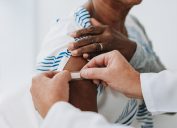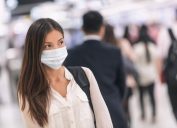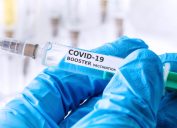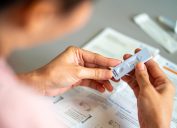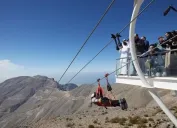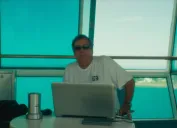New COVID Variant Prompts Travel Warning From Doctors
Healthcare professionals warn that HV.1 is "highly transmissible."
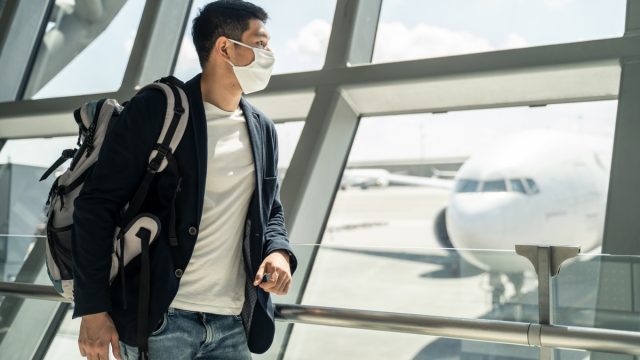
We've come a long way since the height of the COVID-19 pandemic, when most holiday travel was risky. Nowadays, it's less anxiety-inducing to venture to see loved ones, but that doesn't mean that the virus itself isn't still a threat. In fact, doctors have issued a new travel warning in light of a new COVID variant that's accounting for more and more cases. Read on to find out what healthcare professionals want you to be aware of if you're flying this Thanksgiving.
RELATED: Doctor Reveals COVID Symptoms in Patients Who Haven't Gotten a Fall Booster.
The new variant is "highly transmissible."
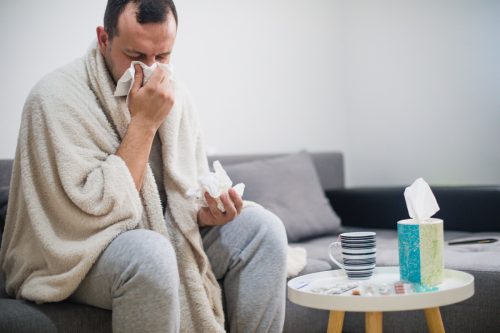
Over the course of just a few weeks, a new COVID-19 variant, HV.1, has become the dominant variant in the U.S., Andrea Garcia, JD, MPH, American Medical Association (AMA) Vice President of Science, Medicine and Public Health, said in a Nov. 20 interview. During the two-week period ending on Nov. 11, HV.1 accounted for 29 percent of new infections in the U.S., per data from the Centers for Disease Control and Prevention (CDC).
In an interview with Today.com, William Schaffner, MD, professor at the Vanderbilt University School of Medicine, also warned that HV.1, as a descendant of the omicron subvariant, is "highly transmissible."
HV.1 causes similar symptoms to other recent variants, including a runny nose, fatigue, headache, muscle aches, and fever or chills, but the most prominent symptoms appear to be congestion, sore throat, and a dry cough, Schaffner told Today.com.
So, to avoid coming down with this new COVID variant before or after your Turkey Day travels, take a few precautions.
RELATED: Doctor Reveals the New COVID Variant Symptoms You Can See on Your Face.
A "bump" in cases is expected, so consider grabbing a mask.
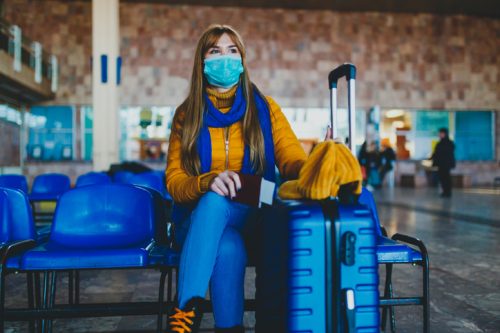
According to the Transportation Security Administration, the 2023 holiday travel season is expected to be the busiest yet—and during the 12-day Thanksgiving travel period, the agency is anticipating screening over 30 million passengers. According to ABC7, as a result of the emerging HV.1 variant and higher passenger volume, public health officials are anticipating an uptick in COVID cases throughout the final months of the year and the beginning of 2024.
"We unfortunately will expect a bump after Thanksgiving and another bump that continues after the December holidays and then another one after the New Year, realistically speaking," Peter Chin-Hong, MD, professor at the University of California, San Francisco's (UCSF) School of Medicine, told ABC7.
To keep yourself safe, doctors say it's probably a good idea to wear a mask, even though mask mandates are no longer in place.
"I would certainly wear a mask in the airport and on the plane," George Rutherford, MD, MA, professor at the University of California San Francisco's School of Medicine, told ABC7. "Especially if you're going long distance."
Certain airports will also be doing their part to try and detect infections, including COVID, offering testing via the CDC's Travel-based Genomic Surveillance Program (TGS), Garcia said. The voluntary program is being expanded to international travelers arriving at four major U.S. airports: Boston Logan, San Francisco, Washington, D.C.'s Dulles International, and John F. Kennedy (JFK) in New York. Travelers are invited to participate in a voluntary nasal swab upon arrival, and the program also involves testing of drains and wastewater.
Numbers are already on the rise—and doctors say vaccine numbers are low.
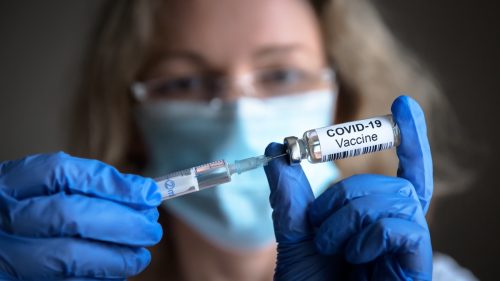
During her AMA interview, Garcia noted that CDC data shows COVID numbers are "increasing in some jurisdictions," and this is compounded by an uptick in RSV cases, as well as an increase in flu activity in most parts of the country.
In light of this data, Garcia reiterated official CDC guidance for everyone over six months of age to get both the flu vaccine and the updated COVID vaccine. (The RSV vaccine is recommended for infants up to 12 months in age and certain older adults.)
However, COVID vaccine uptake numbers are low, with just 13.9 percent of U.S. adults receiving the shot as of Nov. 13, Today.com reported. So, if you haven't made an appointment, you might want to schedule one before your trip. As Schaffner told Today.com, studies have shown that the latest COVID shot "will protect against serious disease caused by HV.1" and the CDC notes it can lower the risk of hospitalization and death.
Chin-Hong offered another warning about HV.1 to the unvaccinated, reiterating that it's "very transmissible."
"So the things that you might have used as strategies before to escape infection, may not work quite as well anymore," he told ABC7.
RELATED: The Most Accurate Time to Take a COVID Test, New Study Reveals.
Flu cases will likely spike, too.
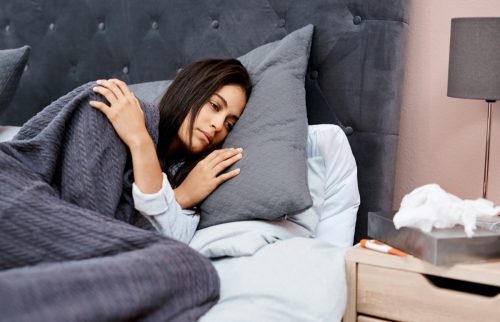
COVID may be top of mind, but the flu still remains a pressing concern during the holiday travel season. In fact, Chin-Hong warned that numbers could double over the course of the winter months.
"We're just at the beginning of our influenza season and they will definitely increase," he told ABC7. "With RSV, hopefully we won't increase too much more and cases will start coming down."
In a piece for Forbes, Dave Wessner, a professor of biology at Davidson College, also warned about an imminent increase in COVID, flu, and RSV cases in the next few months, as we saw similar trends in 2021 and 2022.
So, if you're visiting friends or family members who are at risk, "basic mitigation strategies" can have a significant impact. In addition to getting vaccinated, Wessner recommends wearing a mask and washing your hands.
RELATED: For more up-to-date information, sign up for our daily newsletter.
Best Life offers the most up-to-date information from top experts, new research, and health agencies, but our content is not meant to be a substitute for professional guidance. When it comes to the medication you're taking or any other health questions you have, always consult your healthcare provider directly.
- Source: https://www.ama-assn.org/delivering-care/public-health/cdc-updates-international-travel-new-covid-variant-hv1-beyfortus-and
- Source: https://covid.cdc.gov/covid-data-tracker/#variant-proportions
- Source: https://www.tsa.gov/news/press/releases/2023/11/15/tsa-prepared-thanksgiving-travel-and-dishes-what-foods-can-be
- Source: https://wwwnc.cdc.gov/travel/page/travel-genomic-surveillance
- Source: https://www.cdc.gov/vaccines/hcp/vis/vis-statements/rsv.html
- Source: https://www.cdc.gov/coronavirus/2019-ncov/prevent-getting-sick/prevention.html
